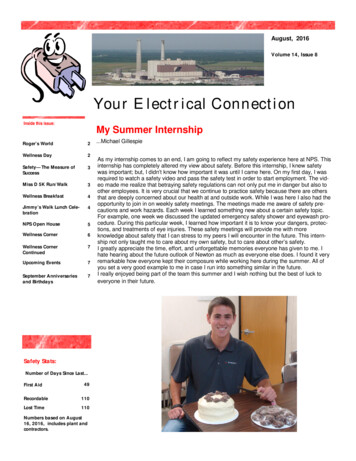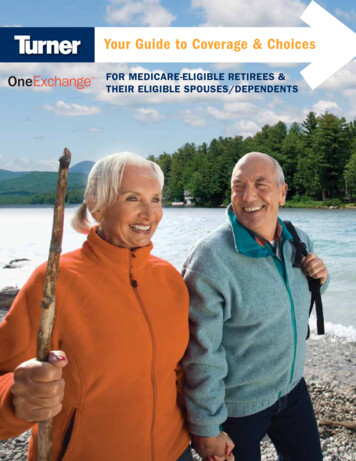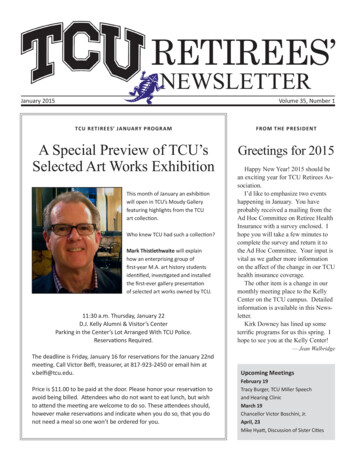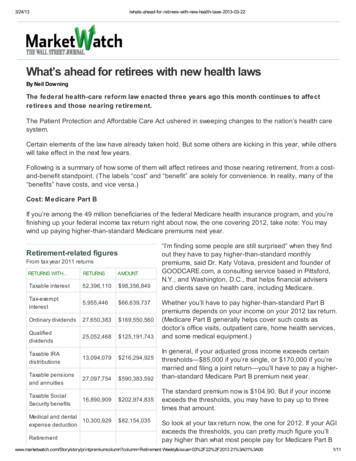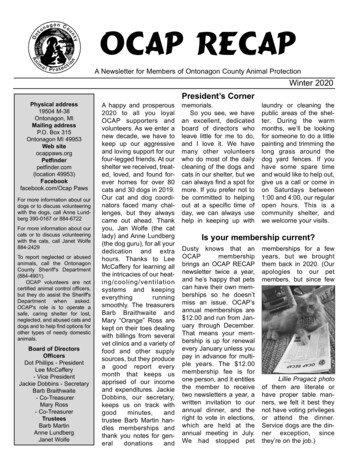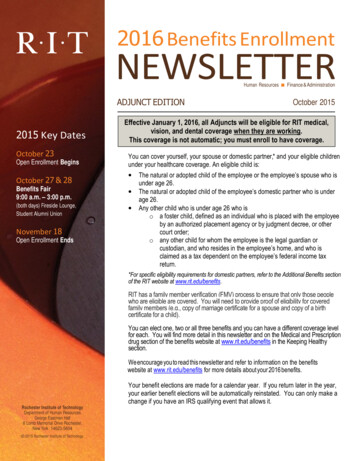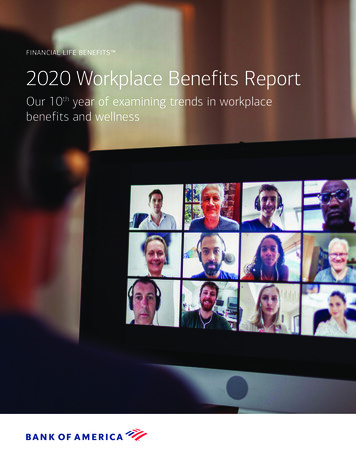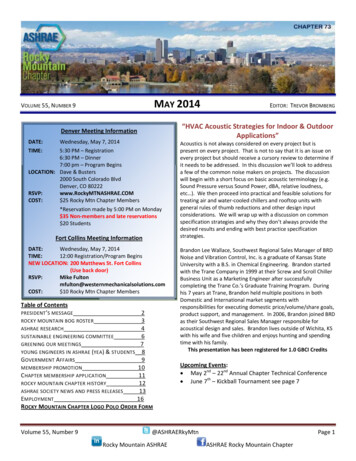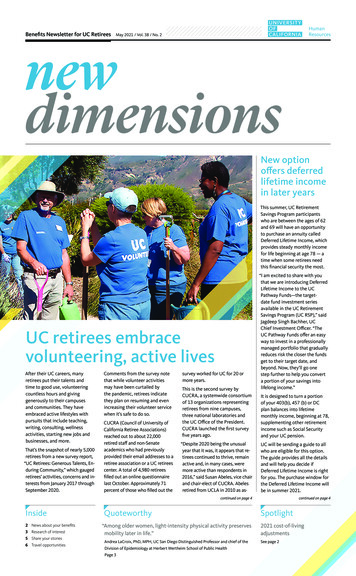
Transcription
newdimensionsBenefits Newsletter for UC RetireesMay 2021 / Vol. 38 / No. 2New optionoffers deferredlifetime incomein later yearsThis summer, UC RetirementSavings Program participantswho are between the ages of 62and 69 will have an opportunityto purchase an annuity calledDeferred Lifetime Income, whichprovides steady monthly incomefor life beginning at age 78 — atime when some retirees needthis financial security the most.UC retirees embracevolunteering, active livesAfter their UC careers, manyretirees put their talents andtime to good use, volunteeringcountless hours and givinggenerously to their campusesand communities. They haveembraced active lifestyles withpursuits that include teaching,writing, consulting, wellnessactivities, starting new jobs andbusinesses, and more.That’s the snapshot of nearly 5,000retirees from a new survey report,“UC Retirees: Generous Talents, Enduring Community,” which gaugedretirees’ activities, concerns and interests from January 2017 throughSeptember 2020.Comments from the survey notethat while volunteer activitiesmay have been curtailed bythe pandemic, retirees indicatethey plan on resuming and evenincreasing their volunteer servicewhen it’s safe to do so.CUCRA (Council of University ofCalifornia Retiree Associations)reached out to about 22,000retired staff and non-Senateacademics who had previouslyprovided their email addresses to aretiree association or a UC retireescenter. A total of 4,980 retireesfilled out an online questionnairelast October. Approximately 71percent of those who filled out thesurvey worked for UC for 20 ormore years.This is the second survey byCUCRA, a systemwide consortiumof 13 organizations representingretirees from nine campuses,three national laboratories andthe UC Office of the President.CUCRA launched the first surveyfive years ago.“Despite 2020 being the unusualyear that it was, it appears that retirees continued to thrive, remainactive and, in many cases, weremore active than respondents in2016,” said Susan Abeles, vice chairand chair-elect of CUCRA. Abelesretired from UCLA in 2010 as as-“I am excited to share with youthat we are introducing DeferredLifetime Income to the UCPathway Funds—the targetdate fund investment seriesavailable in the UC RetirementSavings Program (UC RSP),” saidJagdeep Singh Bachher, UCChief Investment Officer. “TheUC Pathway Funds offer an easyway to invest in a professionallymanaged portfolio that graduallyreduces risk the closer the fundsget to their target date, andbeyond. Now, they’ll go onestep further to help you converta portion of your savings intolifelong income.”It is designed to turn a portionof your 403(b), 457 (b) or DCplan balances into lifetimemonthly income, beginning at 78,supplementing other retirementincome such as Social Securityand your UC pension.UC will be sending a guide to allwho are eligible for this option.The guide provides all the detailsand will help you decide ifDeferred Lifetime Income is rightfor you. The purchase window forthe Deferred Lifetime Income willbe in summer 2021.continued on page 4Inside2 News about your benefits3 Research of interest5 Share your stories6 Travel opportunitiesQuoteworthy“Among older women, light-intensity physical activity preservesmobility later in life.”Andrea LaCroix, PhD, MPH, UC San Diego Distinguished Professor and chief of theDivision of Epidemiology at Herbert Wertheim School of Public HealthPage 3continued on page 4Spotlight2021 cost-of-livingadjustmentsSee page 2
news about your benefitsReminders for retirees transitioning to or in Via BenefitsThe following information is for UC retirees wholive outside of California and who receive (orsoon will receive) their Medicare coordinatedplan through Via Benefits.Health ReimbursementArrangement (HRA)Retirees and their enrolled family membersare reminded to maintain their medical plancoverage through Via Benefits. Any changeto your medical plan also needs to be donethrough Via Benefits; otherwise, you will nolonger be eligible to receive the UC-fundedHealth Reimbursement Arrangement (HRA).In most cases, the HRA funds provided by UCwill cover the cost of the premiums as wellas some additional out-of-pocket health carecosts (such as Medicare Part B premiumsand co-pays for your medical care). You payyour eligible expenses first, and then requestreimbursement from your HRA. Unused HRAfunds roll over year after year provided youcontinue to be in a medical plan through ViaBenefits. The funds in your HRA are forfeitedonce your coverage through Via Benefits ends.New Via Benefits membersEligibility for this UC Medicare Coordinator Program is determined on a monthly basis. If you areMedicare-eligible and live outside of Californiaand will turn 65 soon or if you are at least 65 andplan to move outside of California, Via Benefitswill administer your Medicare plan. If you coveryourself only, Via Benefits will reach out toyou as soon as you are identified as potentiallyeligible for the program. If you currently liveoutside California, communications may beginthe year you turn 64, to ensure you have plentyof time to understand the requirements and yourresponsibilities for enrolling in a plan. If you arecovering one or more family members, you willstart to receive communication from Via Benefitsas soon as your entire family is identified to bepotentially eligible for the program.Current members moving back toCaliforniaIf you return to California during the year andstill reside within your plan’s service area,you will remain in your current plan through2021 cost-of-living adjustmentsUniversity of California Retirement Plan(UCRP) and UC-PERS Plus 5 Plan benefitrecipients, including those receiving survivorand UCRP disability income, will receive acost-of-living adjustment (COLA) effective July1, 2021. The increase will appear in checks paidon July 30.The July 1, 2021 COLA rates are included in thetable below.RETIREMENTDATECOLAOn or beforeJuly 1, 20192.0%July 2, 2019 toJuly 1, 20201.28%How the COLA is calculatedThe 2021 COLA is based on the 1.28 percentaverage increase in the Consumer PriceIndex (CPI) measured from February 2020 toFebruary 2021 for the Los Angeles and SanFrancisco metropolitan areas.The UCRP COLA formula generally matchesthe annual increase in the CPI up to 2 percent.This year, most benefit recipients will receivea COLA that is larger than the 1.28 percentincrease in the CPI. The larger COLA helpsthose UCRP benefit recipients retain more oftheir purchasing power by partially making upfor earlier years of inflation than 2 percent thatwere not matched by the UCRP COLA.The COLA for UC-PERS Plus 5 benefit recipientsis the same as that for UCRP benefit recipientswith a retirement date of October 1, 1991.UCRP benefit recipients are eligible to receivea COLA if they have been retired one full yearby July 1. Therefore, those members whoseretirement or disability date is after July 1, 2020,are not yet eligible to receive a COLA.Via Benefits until the end of the calendar year.If you prefer to return to UC group coverage,your next opportunity to make a plan changewill be during UC’s fall Open Enrollment for aUC Medicare plan option available for retireesresiding in California, effective Jan. 1.If you move back to California and reside outside of your current plan’s service area, you willneed to change your plan through Via Benefitsand remain in the new plan until the end of thecalendar year. You may make a plan change duringUC’s Open Enrollment in the fall for a UC Medicare plan option, effective Jan. 1. You will needto remain in a medical plan through Via Benefitsthat offers coverage in California until the end ofyear in which you move back to California to allowdepletion of your HRA funds. In all cases, remember to change your home address with UC andyour medical carrier through Via Benefits as soonas you move. Per Medicare, your home addressneeds to be a physical street address. A P.O. Boxmay be used as a mailing address.For more information and to read the FAQs onthe Medicare Coordinator Program, visit UCnet:ucal.us/medicarecoordinator or the Via Benefitswebsite at my.viabenefits.com/uc.Take a surveyto improve UC’sOpen EnrollmentcommunicationsIf you’re a retiree who’s eligible for benefitsfrom UC, Open Enrollment brings a lot ofchoices. UC is committed to helping you makeinformed decisions, with a booklet mailed toyour home, an Open Enrollment website and aspecial edition of New Dimensions.We would like to learn more about how youuse these resources and how we can do better— and we need your help. Please take a briefsurvey (available at ucal.us/oeretireesurvey) toshare your feedback. The survey should take5-10 minutes to complete, and all responses willbe completely anonymous and confidential.This survey was developed by a workgroupformed to look for opportunities to improveUC’s benefits education for retirees. Theworkgroup includes representatives from theCouncil of UC Retiree Associations (CUCRA)and the Council of UC Emeriti Associations(CUCEA) and Office of the President staffresponsible for benefits communications.Please go to ucal.us/oeretireesurvey by May 21to help us improve!Thank you in advance for your help.2
uc research of interestYou’ve got tomove it, move itOne in four women over age 65 is unableto walk two blocks or climb a flight of stairs.Known as mobility disability, it is the leadingtype of incapacity in the United States and a keycontributor to a person’s loss of independence.Now, new research from UC San Diegosuggests that light-intensity physical activity,including shopping or a casual walk, mayprotect mobility in older women.“Older adults who want to maintain theirmobility should know that all movement, notjust moderate-to-vigorous physical activity,counts,” said senior author Andrea LaCroix,PhD, MPH, Distinguished Professor and chiefof the Division of Epidemiology at HerbertWertheim School of Public Health. “We foundthat, among older women, light-intensityphysical activity preserves mobility later in life.”Researchers found that women who did nothave a mobility disability at the start of thestudy, and who spent the most amount oftime doing light-intensity activities, were40 percent less likely to experience loss ofmobility over a six-year period.The prospective study observed 5,735 U.S.women age 63 and older, who wore a researchgrade accelerometer for seven days to obtainaccurate measures of their physical activity.The mean time spent in light physical activitywas 4.8 hours per day.Researchers found that women who spentthe most time performing light-intensityphysical activity had a 46 percent lowerrisk of mobility loss compared to womenwho participated in lower levels of physicalactivity. Similar results were observed amongwhite, Black and Latinx women. Women withand without obesity also reduced their riskof mobility disability, but the benefit wasstrongest among women with a body massindex (BMI) of less than 30.Read more: o-move-it-move-itOlder people often incorrectly assumemedicines don’t have potential side effectsDoctors might not need to spend a wholelot of time conveying information on dosage,the number of pills in a prescription or howfrequently medications must be taken. Butthey should spend more time explaining sideeffects to ensure their older patients are fullyinformed, suggests a UCLA study.Researchers examined data on 81 people age 50an older who were in a previous study aimed atimproving how physicians communicate aboutnewly prescribed medications. They foundthat patients correctly ascertained informationsuch as dosage and duration of use for morethan 70 percent of the medications theywere prescribed, regardless of whether theirphysician explained it during an office visit.But when physicians failed to verbally provideinformation about potential side effects,people incorrectly assumed that about 55percent of their prescribed medications hadnone. And even when physicians did discusspossible side effects, their patients incorrectlyassumed there were no side effects for 22percent of the medications.Gaps in knowledge about side effects mayput people, particularly older people, atrisk for medication nonadherence. Patientsmay be less likely to take or continue takingmedications if they discover the existence ofpotential adverse effects without having theopportunity to discuss those side effects withtheir physicians in a timely manner.Study authors were: Timothy Ho, BlancaCampos, and Derjung Tarn, all of theDepartment of Family Medicine, David GeffenSchool of Medicine at UCLA.Read more at: dication-side-effects3
continued storiesRetirees embrace volunteering continued from page 1sociate vice chancellor-corporatefinancial services/controller.John Meyer, CUCRA chair, said,“We believe it’s valuable for ourorganization to assess and reporton the level of engagementretirees maintain with theircampuses and their communities.”“This can then be shared withuniversity and campus leaders tounderscore the ongoing value ofretirees,” said Meyer, who retiredfrom UC Davis in 2014 as itsadministrative vice chancellor.Active retirementA majority of respondentsreported having an active lifestyle:60 percent were engaged instaying physically fit; 58 percenthad traveled; 50 percent gardened;47 percent spent time outdoorsand in nature; and 32 percentenjoyed the performing arts.“Half of my days are spent ondeveloping homeowner handymanskills. I never did it when I wasworking — no time. I enjoy it and itkeeps me moving,” wrote a retiree.Volunteering in communityand UCSeventy percent of surveyrespondents reported somekind of volunteer activity,mostly for community and civicorganizations, faith-based groupsand political causes.A wide range of skills werevolunteered, from book-mendingand boat repair to gardeningand meditation. One retireeperformed magic at a day centerfor adults with memory issues.“My husband and I started anonprofit building schools inBurma (Myanmar),” wrote a surveyrespondent. “We will have built 67schools by the end of 2020.”Twenty-five percent of respondents said they have volunteeredfor UC, indicative of the enduring connection many feel to theirhome campuses, medical centersand laboratories. Retirees for UChave served as volunteer mentors,teachers, advisers, fundraisersand participants in many campusprograms and activities.“I’d like to suggest that the UCmake better use of their retirees.We have institutional memoryand experience that remains avaluable asset. I feel mine is beingwasted (and I am only 61!),” notedone retiree.Professional engagementMore than 42 percent said theyprovided professional services ona pay or pro bono basis. The mostcited examples were teaching,consulting and serving on a boardof directors.of non-fiction such as histories,science writing and journalisticarticles.Encore careersSome survey respondentshave worked in paid positionssince retiring: 17 percent fororganizations outside UC; 14percent self-employed; 10 percentfor UC, full- or part-time.“Moving to a small town of 500closely-knit people, I knew no oneand no one knew me,” wrote a UCretiree. “I became a sub-rural mailcarrier My rural route consistedof 400 residences, and afterdelivering their mail to them fornine years I not only knew everyperson by name but every personknew me by name.”Another retiree wrote, “I met theman of my dreams late in life andwe discovered that we both lovesustainable living so we started asolar business together and it isfinally taking off.”Caregiving“I continue to teach math andstatistics for the college programat San Quentin State Prison,under the auspices of the PrisonUniversity Project. (All instructorsare volunteers.),” wrote a retiree.More than half of the respondents,53 percent, served as caregivers.The high number was perhaps duein part to the upheaval caused bythe pandemic, survey organizerssaid. Some respondents notedthat they were helping outtheir children who had becomeunemployed or assisting with thecare of grandchildren learning athome while their parents worked.Twenty-one percent said theyhave been authors, especiallyMany survey respondentscommented about theircaregiving, which can bring delightor struggle:“Helping take care of grandchildrenbrings me joy. Helping my neighbors in my retirement communityalso gives me joy.”“If I didn’t help my father and myelderly aunt and uncle they wouldneed to live in assisted living. Myhelp keeps them independent.”“I found myself simultaneouslyproviding child care for a newgrandchild and managing medical appointments and care for mymother who was diagnosed withovarian cancer and consequentlypassed away. There is no way tofully prepare oneself for the pressure this can put on an individual.”PhilanthropyUC retirees are not only generouswith their time and talents. Thousands of retirees have also donated more than 60 million to UCcampuses over the past four fiscalyears, according to data providedby retiree associations, retirementcenters and development offices.“The financial contributions retireeshave made to their former campuses, coupled with the extent to whichretirees volunteer at UC, are all indications of the degree to which theseretirees feel a continued connectionto UC and support the mission ofthe university,” Abeles said.To view the complete survey report,visit http://cucra.org/surveyDeferred lifetime income continued from page 1The following are some importantfeatures: To be eligible you must be aUC RSP participant betweenages 62 and 69, and have acombined account balance ofat least 40,000 in your UC RSPaccounts. If you choose to purchaseDeferred Lifetime Income, youenter into an annuity contractwith an insurance companyvetted by UC. You pay theinsurer a specific amount ofmoney from your UC RSPbalance (minimum 10,000, upto a maximum of 135,000 or25% of your balance).4 At age 78, you’ll start receivingguaranteed, monthly paymentsfrom the insurer that continuefor the rest of your life. You can choose one of threeincome payment options: a“Single Life” monthly incomefrom 78 until your death or“Joint & Survivor” options of 50or 75 percent. In the latter, youreceive monthly income from78 until death, and then yourspouse will receive 50 or 75 percent (depending on your optionchoice) for the rest of their life. There will be an annual costof living adjustment; monthlybenefits will increase by 2percent each year to help offsetthe impact of inflation. Be reassured that if you (or youand your spouse, if applicable)die before the total paymentsreach the full purchase amount,your beneficiary(ies) receivethe difference.Before making a decision aboutpurchasing Deferred LifetimeIncome, you’re encouraged todiscuss your financial situationwith a UC-dedicated FidelityRetirement Planner or yourfinancial advisor.To make an appointment with aFidelity Retirement Planner, call(800) 558-9182, Monday–Friday,5 a.m. – 6 p.m. PT, or scheduleonline at fidelity.com/schedule.To learn about other ways tocreate automatic withdrawals,view online tools to decideon an option that is best foryou, or look at other resourcesfor your retirement planninggo to myUCretirement.com retirement income strategies.
share your storiesHealthcare technology towriting fictionLearning Spanish,penning short storiesRobert Steven GoldsteinHealthcare Information Services,UCSFGeary (Reggie) RadcliffeComputer help desk technician,Los Alamos National LaboratoryIt has been a lifelong dream of mine to write fiction.After working 25 years for UC, it was time to retireand begin new adventures. The plan is to travel toSpanish speaking countries and enroll in one-onone Spanish language classes.I learned to read when I was three-years-old andbegan writing stories almost immediately afterthat. At the age of seven, I had a poem publishedin my elementary school newspaper. When I was a senior in highschool I took first prize in Scholastic’s national short story contestwith a ta
Lifetime Income to the UC Pathway Funds—the target-date fund investment series available in the UC Retirement Savings Program (UC RSP),” said Jagdeep Singh Bachher, UC Chief Investment Officer. “The UC Pathway Funds offer an easy way to invest in a professionally managed portfolio that gra
